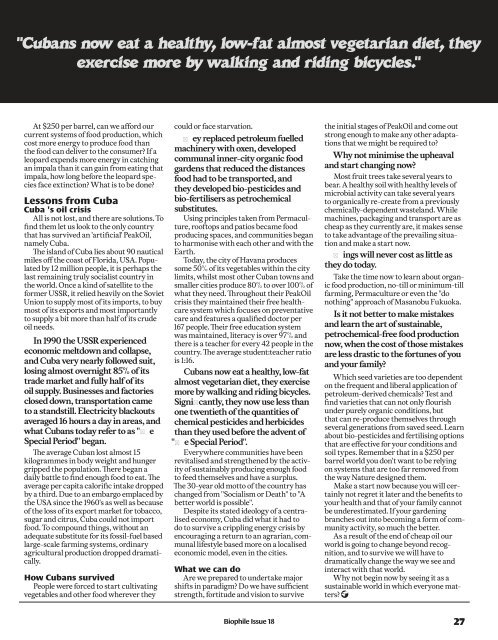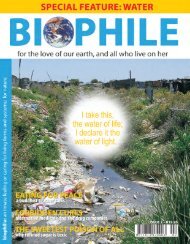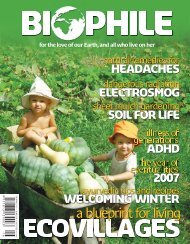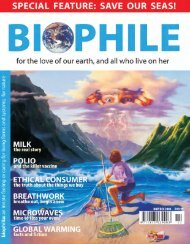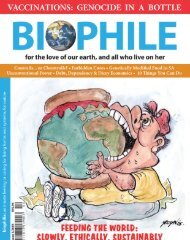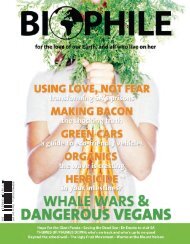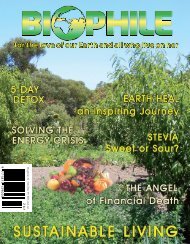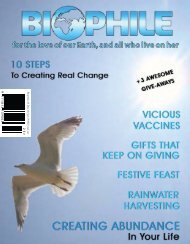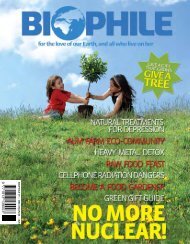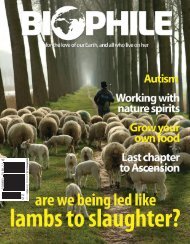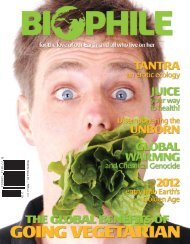B io ph ile Issu e 18 - Biophile Magazine
B io ph ile Issu e 18 - Biophile Magazine
B io ph ile Issu e 18 - Biophile Magazine
You also want an ePaper? Increase the reach of your titles
YUMPU automatically turns print PDFs into web optimized ePapers that Google loves.
"Cubans now eat a healthy, low-fat almost vegetarian diet, theyexercise more by walking and riding bicycles."At $250 per barrel, can we afford ourcurrent systems of food product<strong>io</strong>n, whichcost more energy to produce food thanthe food can deliver to the consumer? If aleopard expends more energy in catchingan impala than it can gain from eating thatimpala, how long before the leopard speciesface extinct<strong>io</strong>n? What is to be done?Lessons from CubaCuba 's oil crisisAll is not lost, and there are solut<strong>io</strong>ns. Tofind them let us look to the only countrythat has survived an 'artificial' PeakOil,namely Cuba.The island of Cuba lies about 90 nauticalm<strong>ile</strong>s off the coast of Florida, USA. Populatedby 12 mill<strong>io</strong>n people, it is perhaps thelast remaining truly socialist country inthe world. Once a kind of satellite to theformer USSR, it relied heavily on the SovietUn<strong>io</strong>n to supply most of its imports, to buymost of its exports and most importantlyto supply a bit more than half of its crudeoil needs.In 1990 the USSR experiencedeconomic meltdown and collapse,and Cuba very nearly followed suit,losing almost overnight 85% of itstrade market and fully half of itsoil supply. Businesses and factoriesclosed down, transportat<strong>io</strong>n cameto a standstill. Electricity blackoutsaveraged 16 hours a day in areas, andwhat Cubans today refer to as "TheSpecial Per<strong>io</strong>d" began.The average Cuban lost almost 15kilogrammes in body weight and hungergripped the populat<strong>io</strong>n. There began adaily battle to find enough food to eat. Theaverage per capita calorific intake droppedby a third. Due to an embargo emplaced bythe USA since the 1960's as well as becauseof the loss of its export market for tobacco,sugar and citrus, Cuba could not importfood. To compound things, without anadequate substitute for its fossil-fuel basedlarge-scale farming systems, ordinaryagricultural product<strong>io</strong>n dropped dramatically.How Cubans survivedPeople were forced to start cultivatingvegetables and other food wherever theycould or face starvat<strong>io</strong>n.They replaced petroleum fuelledmachinery with oxen, developedcommunal inner-city organic foodgardens that reduced the distancesfood had to be transported, andthey developed b<strong>io</strong>-pesticides andb<strong>io</strong>-fertilisers as petrochemicalsubstitutes.Using principles taken from Permaculture,rooftops and pat<strong>io</strong>s became foodproducing spaces, and communities beganto harmonise with each other and with theEarth.Today, the city of Havana producessome 50% of its vegetables within the citylimits, whilst most other Cuban towns andsmaller cities produce 80% to over 100% ofwhat they need. Throughout their PeakOilcrisis they maintained their free healthcaresystem which focuses on preventativecare and features a qualified doctor per167 people. Their free educat<strong>io</strong>n systemwas maintained, literacy is over 97% andthere is a teacher for every 42 people in thecountry. The average student:teacher rat<strong>io</strong>is 1:16.Cubans now eat a healthy, low-fatalmost vegetarian diet, they exercisemore by walking and riding bicycles.Significantly, they now use less thanone twentieth of the quantities ofchemical pesticides and herbicidesthan they used before the advent of"The Special Per<strong>io</strong>d".Everywhere communities have beenrevitalised and strengthened by the activityof sustainably producing enough foodto feed themselves and have a surplus.The 30-year old motto of the country haschanged from "Socialism or Death" to "Abetter world is possible".Despite its stated ideology of a centralisedeconomy, Cuba did what it had todo to survive a crippling energy crisis byencouraging a return to an agrarian, communallifestyle based more on a localisedeconomic model, even in the cities.What we can doAre we prepared to undertake majorshifts in paradigm? Do we have sufficientstrength, fortitude and vis<strong>io</strong>n to survivethe initial stages of PeakOil and come outstrong enough to make any other adaptat<strong>io</strong>nsthat we might be required to?Why not minimise the u<strong>ph</strong>eavaland start changing now?Most fruit trees take several years tobear. A healthy soil with healthy levels ofmicrobial activity can take several yearsto organically re-create from a prev<strong>io</strong>uslychemically-dependent wasteland. Wh<strong>ile</strong>machines, packaging and transport are ascheap as they currently are, it makes senseto take advantage of the prevailing situat<strong>io</strong>nand make a start now.Things will never cost as little asthey do today.Take the time now to learn about organicfood product<strong>io</strong>n, no-till or minimum-tillfarming, Permaculture or even the "donothing" approach of Masanobu Fukuoka.Is it not better to make mistakesand learn the art of sustainable,petrochemical-free food product<strong>io</strong>nnow, when the cost of those mistakesare less drastic to the fortunes of youand your family?Which seed varieties are too dependenton the frequent and liberal applicat<strong>io</strong>n ofpetroleum-derived chemicals? Test andfind varieties that can not only flourishunder purely organic condit<strong>io</strong>ns, butthat can re-produce themselves throughseveral generat<strong>io</strong>ns from saved seed. Learnabout b<strong>io</strong>-pesticides and fertilising opt<strong>io</strong>nsthat are effective for your condit<strong>io</strong>ns andsoil types. Remember that in a $250 perbarrel world you don't want to be relyingon systems that are too far removed fromthe way Nature designed them.Make a start now because you will certainlynot regret it later and the benefits toyour health and that of your family cannotbe underestimated. If your gardeningbranches out into becoming a form of communityactivity, so much the better.As a result of the end of cheap oil ourworld is going to change beyond recognit<strong>io</strong>n,and to survive we will have todramatically change the way we see andinteract with that world.Why not begin now by seeing it as asustainable world in which everyone matters?B<strong>io</strong><strong>ph</strong><strong>ile</strong> <strong>Issu</strong>e <strong>18</strong>27


